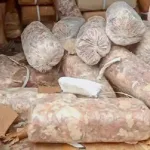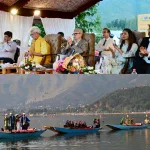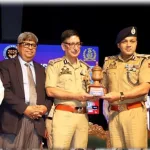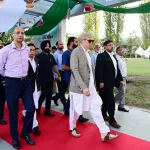DEATH ANNIVERSARY
Amidst the labyrinthine streets of old Delhi, the area around Jamia Masjid stands as a testament to the bustling energy and rich history of the city. The market is a cacophony of sights, sounds and smells where vendors peddle their wares with an almost frenzied intensity. The air is thick with the aroma of street food, and the clamor of haggling customers mixes with the melodic call to prayer from the historic Jamia Masjid. In the midst of the throngs of people, winding alleys and bustling bazaars lies hidden an oasis of peace and tranquility-The Maulana Azad’s (R.A) Tomb. Its exact location, like so much else in this labyrinthine urban landscape, is not easily discernible to the uninitiated.
I have been to Jama Masjid countless times before. The mosque with its elegant arches and delicate minarets has always been a place of sanctuary for me. But despite my many visits, it never occurred to me to venture to the nearby Tomb of Maulana Azad (R.A). For years I had heard stories about this great man’s life and work from my father, about his zest for freedom, his deep and tireless efforts to promote secularism and social justice and his deep commitment to prevent the partition of country. But it wasn’t until recently that I began to truly appreciate the full extent of his legacy.
Maulana Azad (R.A) was born Mohiuddin Ahmad on 11 November 1888 in Qidwah in the holy city of Mecca. His father Maulana Khairuddin later shifted back to India in 1895 and made Calcutta his Home. Though Azad (R.A) had no formal education, yet at an impressive age of 24, he started his own paper Al-Hilal (The Crescent) out of his own scant resources to promote the cause of Indian Nationalism and Islamic revivalism. Al-Hilal was staunchly Anti Imperialist and the popularity it gained among masses made the colonial govt. to mount persistent attacks on it in the form of fines and security deposits. Forced to shut it down, Azad (R.A) launched another paper Al-Balagh in 1915. And it was shortly afterwards that Azad (R.A) was exiled to Ranchi in March 1916.
After his first meeting with Gandhiji in 1920, Azad (R.A) threw his whole weight behind the freedom movement and was part of almost every mass agitation. In 1923 at an age of 35 Azad (R.A) became the youngest person to serve as president of Indian National Congress. Which is a testament to his stature. And in 1940 he again headed INC during the critical years of Indian national movement.
In the tumultuous aftermath of India’s partition, few individuals suffered as acutely as the Maulana Abul Kalam Azad (R.A). This man, whose intellect and erudition were matched only by his fierce commitment to the idea of a unified, secular India, was forced to bear witness to the bloody birth of two nations. For Maulana Azad (R.A), the trauma of partition was not only a matter of political dislocation, but a spiritual wound that cut deep into his soul.
In the years leading up to partition, Maulana Azad (R.A) had been one of the most vocal opponents of the idea of dividing India along religious lines. He had argued passionately that the country’s diversity was its greatest strength, and that the only way forward was for Hindus and Muslims to coexist in a pluralistic democracy. But as the forces of communalism gained strength, and the British government began to hasten its departure from the subcontinent, it became clear that Maulana Azad (R.A)’s vision of a united India was no longer tenable.
As the reality of partition set in, Maulana Azad (R.A) was consumed by a sense of grief and despair. He saw in the creation of Pakistan not only a betrayal of his own ideals, but a tragedy that would haunt the subcontinent for generations to come. In his heart, he knew that the partition would lead to the displacement and suffering of millions of people, and that the wounds it inflicted on the psyche of the subcontinent would take decades to heal.
But despite his anguish, Maulana Azad (R.A) refused to give up hope. He continued to believe that the idea of a united India, in which all communities could live in peace and harmony, was still possible. In the years that followed partition, he worked tirelessly to promote interfaith dialogue and to combat the forces of communalism that threatened to tear the country apart. His commitment to the cause of unity was unwavering, even as he saw his dreams shattered by the events of 1947.
For Maulana Azad (R.A), the pain of partition was not just a matter of politics, but a personal tragedy. He had dedicated his life to the idea of a secular, democratic India, and had fought tirelessly to ensure that it became a reality. The partition shattered his faith in the country he had loved and served so well, but it did not break his spirit.
As India’s first Education Minister, Maulana Azad (R.A) laid the foundations for a modern and inclusive education system that has helped millions of Indians realize their dreams. He was a staunch proponent of free and compulsory education for all, and played a key role in the establishment of the Indian Institutes of Technology, the University Grants Commission, and the Indian Council of Historical Research. Maulana Azad (R.A) was also a gifted writer and orator, whose works continue to inspire and educate people across the country. His magnum opus, the Tarjumanul Quran, is a seminal work of Islamic scholarship that has been translated into several languages. His speeches and writings on nationalism, secularism, and communal harmony are a testament to his unwavering commitment to the ideals of justice and equality.
To attempt to encapsulate the life of a figure as multifaceted and dynamic as Maulana Azad (R.A) in the pages of a mere newspaper article is to engage in an act of hubris. Azad (R.A) was a towering intellectual, a scholar of immense depth and range, a tireless political leader, and a visionary who left an indelible mark on the history of the Indian subcontinent. To capture the full sweep of Azad (R.A)’s life and legacy in a newspaper article is to do him a disservice. It is to reduce him to a set of bullet points and sound bites, to strip away the nuance and complexity that made him such a formidable figure. Azad (R.A) was not just a scholar, or a politician, or a religious leader – he was all of these things, and more. He was a man of contradictions, of strengths and weaknesses, of triumphs and setbacks.
To truly do justice to Azad(R.A)’s life, one would need to write not just an article, but a book – or perhaps a series of books. One would need to delve deep into his ideas, his struggles, his relationships, his achievements, and his failures. One would need to examine not just the events of his life, but the social and political context in which they occurred. And one would need to do all of this with a level of nuance, sensitivity, and depth that is simply not possible in the confines of a newspaper article.
In the end, we can only scratch the surface of Maulana Azad (R.A)’s life and legacy in the pages of a newspaper. But even that is worth doing, if only to remind ourselves of the incredible range and complexity of the figures who have shaped our world – and to inspire us to delve deeper, to explore more, and to strive to understand the richness and diversity of the human experience.
(Author is Manager at J&K Bank. He can be mailed at [email protected])





